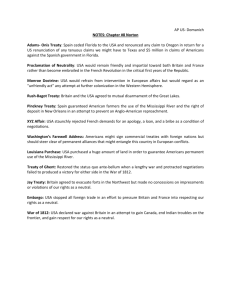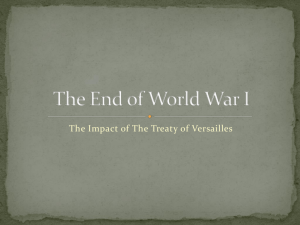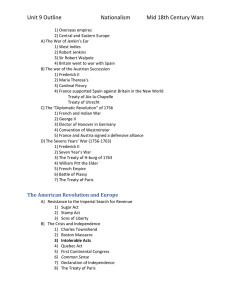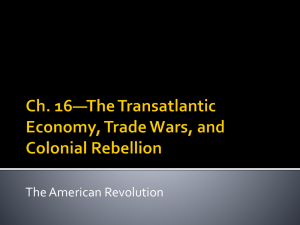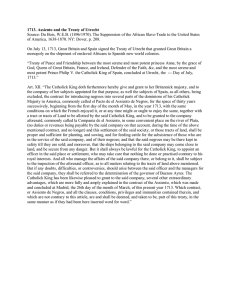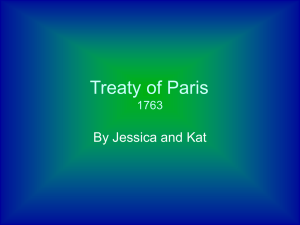Treaty of Paris (1763)
advertisement
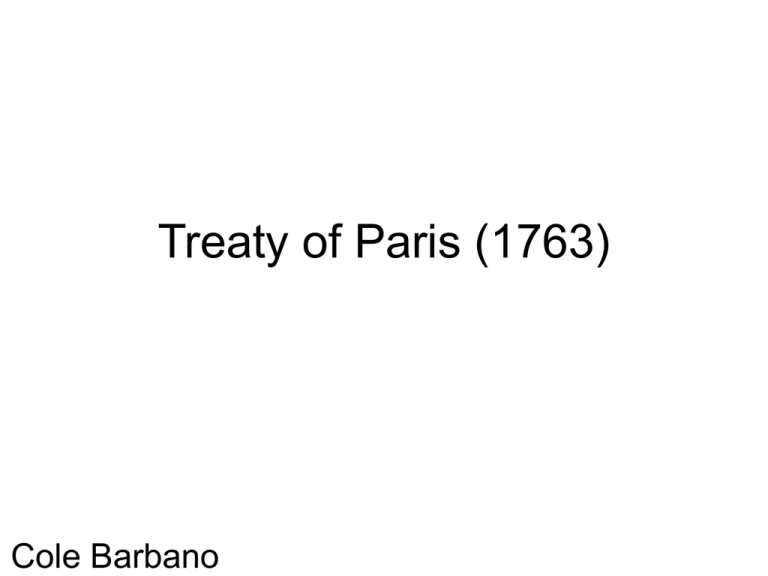
Treaty of Paris (1763) Cole Barbano US Treaty: Treaty of Paris 1763 It has pleased the Most High to diffuse the spirit of union and concord among the Princes, whose divisions had spread troubles in the four parts of the world, and to inspire them with the inclination to cause the comforts of peace to succeed to the misfortunes of a long and bloody war, which having arisen between England and France during the reign of the Most Serene and Most Potent Prince, George the Second, by the grace of God, King of Great Britain, of glorious memory, continued under the reign of the Most Serene and Most Potent Prince, George the Third, his successor, and, in its progress, communicated itself to Spain and Portugal: Consequently, the Most Serene and Most Potent Prince, George the Third, by the grace of God, King of Great Britain, France, and Ireland, Duke of Brunswick and Lunenbourg, Arch Treasurer and Elector of the Holy Roman Empire; the Most Serene and Most Potent Prince, Lewis the Fifteenth, by the grace of God, Most Christian King; and the Most Serene and Most Potent Prince, Charles the Third, by the grace of God, King of Spain and of the Indies, after having laid the foundations of peace in the preliminaries signed at Fontainebleau the third of November last; and the Most Serene and Most Potent Prince, Don Joseph the First, by the grace of God, King of Portugal and of the Algarves, after having acceded thereto, determined to compleat, without delay, this great and important work. For this purpose, the high contracting parties have named and appointed their respective Ambassadors Extraordinary and Ministers Plenipotentiary, viz. his Sacred Majesty the King of Great Britain, the Most Illustrious and Most Excellent Lord, John Duke and Earl of Bedford, Marquis of Tavistock, c. his Minister of State, Lieutenant General of his Armies, Keeper of his Privy Seal, Knight of the Most Noble Order of the Garter, and his Ambassador Extraordinary and Minister Plenipotentiary to his Most Christian Majesty; his Sacred Majesty the Most Christian King, the Most Illustrious and Most Excellent Lord, Csar Gabriel de Choiseul, Duke of Praslin, Peer of France, Knight of his Orders, Lieutenant General of his Armies and of the province of Britanny, Counsellor of all his Counsils, and Minister and Secretary of State, and of his Commands and Finances: his Sacred Majesty the Catholick King, the Main Idea The Treaty of Paris was signed on 10 February 1763, by the kingdoms of Great Britain, France and Spain, with Portugal in agreement. It ended the French and Indian War (Seven Years War). The treaty marked the beginning of an extensive period of British dominance outside Europe. Point of View Britain took over all lands in the western hemisphere for the most part. Prussia felt betrayed by Britain due to the results that they believed were unfair to Prussia Inferences The treaty did not involve either Prussia or Austria who signed a separate Treaty of Hubertusburg. There were multiple exchanges in territory between all of the countries involved
